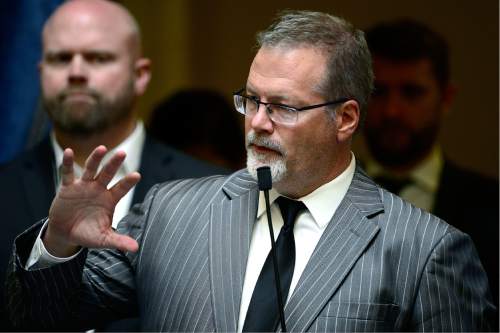This is an archived article that was published on sltrib.com in 2016, and information in the article may be outdated. It is provided only for personal research purposes and may not be reprinted.
Sen. Steve Urquhart's noble efforts to make Utah a kinder, gentler place were half successful in the state Senate the other day.
In a body that sometimes seems determined to show government at its most callous, that was no small accomplishment.
On the positive side, the Republican from St. George Wednesday was able to convince his colleagues to approve a bill that would take the death penalty, an outdated relic of more brutal times, off the books in Utah.
The vote in favor of Senate Bill 189 was the minimum necessary to move it along, 15-12. The bill now goes to the House, where Urquhart is optimistic about its chances. If he is right about that, it goes to Gov. Gary Herbert who, though he has expressed support for the ultimate punishment for the most heinous crimes, should sign it.
Capital punishment is slowly but surely withering away as a tool in civilized society. It is expensive. It brutalizes all it touches, including the state, the officials tasked with carrying it out and, worst of all, the survivors of the victims of crime. We would be well rid of it.
That same day, on the not-so-positive end, Urquhart's principled effort to make the state's hate crimes statute into something that could actually be enforced was defeated, also by a narrow margin.
Senate Bill 107 was voted down 17-11. Urquhart had been confident that he could get that bill through the Senate, at least until statements from The Church of Jesus Christ of Latter-day Saints turned away a handful of senators by raising some incoherent objections about an enforceable hate crimes law upsetting last year's compromise that led to a statewide anti-discrimination law.
There is nothing unbalanced about SB107. All it would do is allow prosecutors around the state to ratchet up the severity of acts that are already crimes — things such as assault or vandalism — when it can be shown that animosity toward a particular group was a motivating factor.
When acts of violence or destruction are clearly intended to strike fear into the hearts not just of their immediate victims, but all those who share characteristics such as religion, ethnicity or sexual orientation, that's a hate crime. Or, more precisely, terrorism.
The enhanced penalties would not only come into play in cases where the victim is a minority, but would apply equally if the target were a white, straight, male Mormon.
Urquhart has, over the past year or two, stood out as a voice of reason of the Senate. Sadly, he is not seeking re-election this year, which means the Legislature, and the state, will wait to see who will step up to fill that role.



